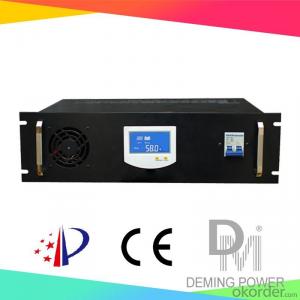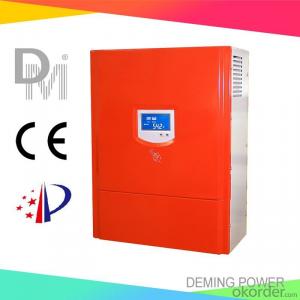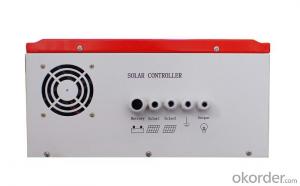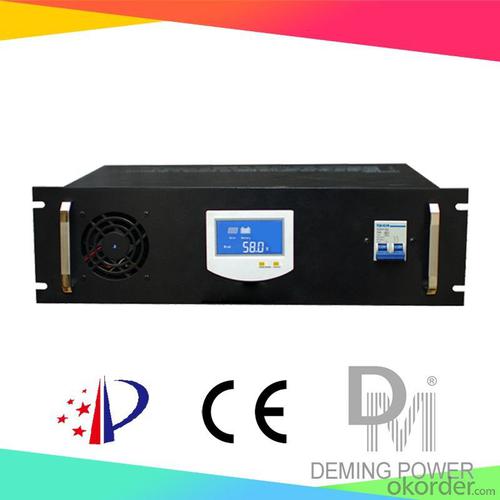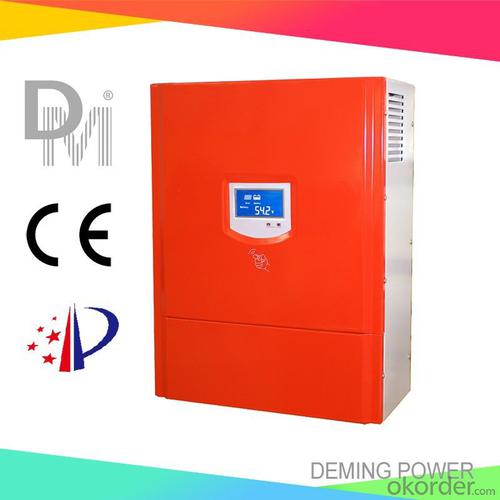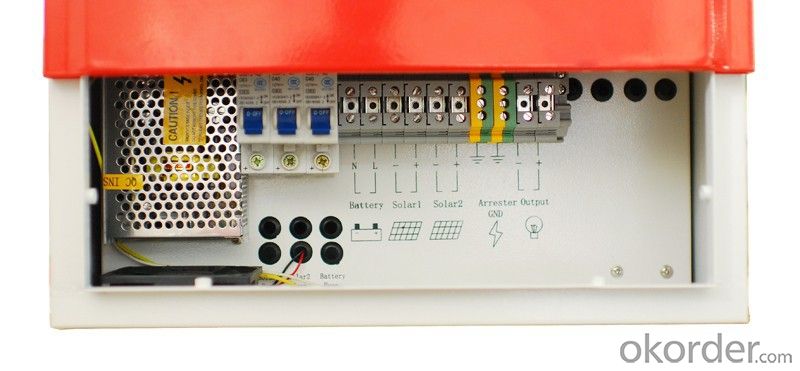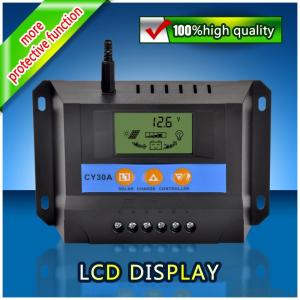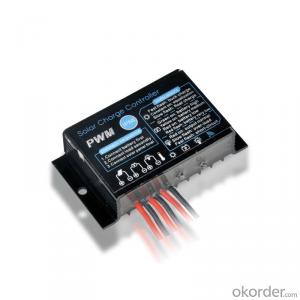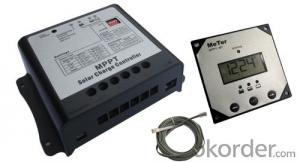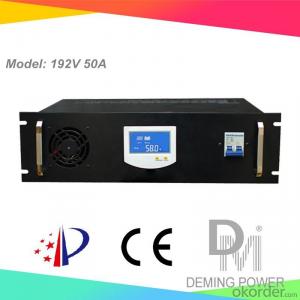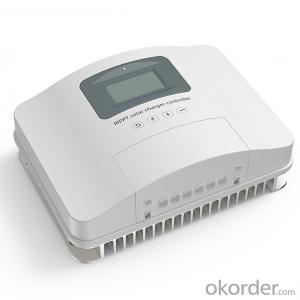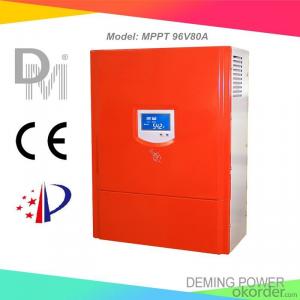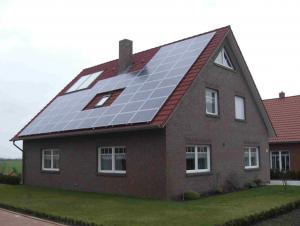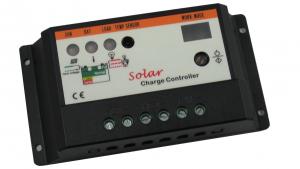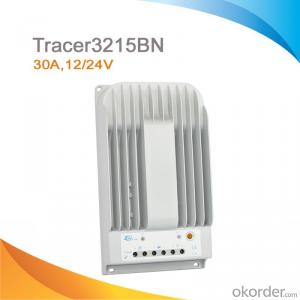Sukam MPPT Solar Charge Controller 192V 30A for Off-Grid Solar Power System with RS485
- Loading Port:
- Qingdao
- Payment Terms:
- TT OR LC
- Min Order Qty:
- 1 PCS
- Supply Capability:
- 1000 PCS/month
OKorder Service Pledge
OKorder Financial Service
You Might Also Like
Properties of the solar charge controller
1. Design for off-grid solar power system.
2. Applicable to different kinds of batteries.
3. Adopts MPPT technology (Maximum Power Point Tracking). The advanced tracking algorithm make the solar module operate at ideal voltage which the solar modules can produce the maximum available power.
4. Modular design with simple structure and easy maintenance.
5. Automatic power control function.
6. LCD display: Solar panel current, solar panel voltage, solar panel power, battery group voltage, charge current.
7. Perfect protection function: Solar reverse charge protection, Solar reverse connection protection, Battery reverse connection protection, Battery overcharge protection, Battery over current protection etc ,thus the system has higher reliability.
Technical parameters of the solar charge controller
Model | 192V30A | ||
Battery group rated voltage | 192Vdc | ||
PV Rated current | 30A | ||
PV open circuit voltage | 500V | ||
PV Max. power | 5760Wp | ||
MPPT input DC voltage range | 150-240Vdc | ||
Input PV module road number | 1 | ||
Function | MPPT charge mode, auto stop charge, auto recharge voltage; Protection: connecting contrary, over current, short circuit, over heat etc. | ||
Display mode | LCD | ||
Display content | solar panel voltage, solar panel current, solar panel power, battery voltage, charge current | ||
Floating Charge Voltage (adjustable) | 110Vdc | ||
Stop charge voltage | 116Vdc±1% | ||
Recharge voltage | 108V±1% | ||
Voltage drop between PV and battery | 1.5V | ||
Max itself power consumption | 100mA-150mA | ||
Work environment temperature | -30-60°C | ||
Relative humidity | 90% No condensation | ||
Applicable altitude | 3000m The rated power should be reduced when it is higher than 2000m | ||
Noise (1m) | 40dB | ||
Degree of protection | IP20(Indoor) | ||
Cooling method | Forced air cooling | ||
*Communication interface (optional) | RS485/USB | ||
*Temperature compensation(optional) | -4mv/°C/2V,-35°C~+80°C,Accuracy:±1°C | ||
Product size (mm) | 520*430*200mm, (Black one) 480*360*150mm, (Red one) | ||
Weight(kg) | 12Kg(Black one) 14kg(Red one0 | ||
*Above parameter only for reference. Could be custom made to user specifications.
- Q: What is the maximum voltage drop allowed in the system by a solar controller?
- The maximum voltage drop allowed in a system by a solar controller depends on the specific controller's specifications and requirements. It is essential to consult the manufacturer's guidelines or documentation to determine the exact maximum voltage drop allowed for that particular solar controller.
- Q: Can a solar controller be used with a 48V battery bank?
- Yes, a solar controller can be used with a 48V battery bank. The solar controller is responsible for regulating the flow of electricity from the solar panels to the battery bank. It ensures that the batteries are charged efficiently and protects them from overcharging or discharging. Most solar controllers have a wide voltage range capability, which includes compatibility with 48V battery banks. Therefore, as long as the solar controller is designed to handle the voltage of the battery bank, it can be used effectively in a 48V system. It is important to ensure that the solar controller is compatible with the specific battery bank voltage before installation to avoid any compatibility issues.
- Q: What is the maximum number of load control modes supported by a solar controller?
- The maximum number of load control modes supported by a solar controller can vary depending on the specific model and manufacturer. However, some advanced solar controllers can support multiple load control modes, typically ranging from 2 to 4 modes.
- Q: Can a solar controller be used with a solar-powered fish farm?
- Yes, a solar controller can be used with a solar-powered fish farm. A solar controller regulates the charging and discharging of batteries in a solar power system, ensuring optimal performance and protection. In a solar-powered fish farm, the solar controller can be used to manage the solar panels' energy output, ensuring a constant and efficient power supply to the farm's infrastructure, such as pumps, aerators, and monitoring systems.
- Q: Can a solar controller be used with solar panel bird deterrent systems?
- Certainly! Solar panel bird deterrent systems can indeed utilize a solar controller. This nifty device plays a vital role in managing and overseeing the electricity flow from the solar panels to the bird deterrent system. Its primary function lies in ensuring the batteries of the system are charged optimally by the solar panels, while also safeguarding against overcharging or battery damage. Consequently, the solar controller assumes a crucial role in guaranteeing the effective operation and durability of the solar panel bird deterrent system.
- Q: What is the purpose of the battery equalization feature on a solar controller?
- The purpose of the battery equalization feature on a solar controller is to ensure that all batteries in a solar power system are charged and discharged evenly. This helps to prevent imbalances in the battery bank, which can lead to reduced battery performance and shortened lifespan. By equalizing the charge levels of the batteries, the feature maximizes the overall efficiency and longevity of the system.
- Q: Can a solar controller be used with different types of solar panel monitoring systems?
- Yes, a solar controller can generally be used with different types of solar panel monitoring systems as long as they are compatible and the necessary communication protocols are supported. However, it is important to ensure that the solar controller is specifically designed to work with the particular monitoring system being used to ensure optimal functionality and compatibility.
- Q: Can a solar controller be used in a solar-powered emergency backup system?
- Yes, a solar controller can be used in a solar-powered emergency backup system. A solar controller helps regulate the charging and discharging of batteries in a solar system, ensuring optimal performance and preventing overcharging or damage to the batteries. In an emergency backup system, a solar controller would play a crucial role in managing the power generated by the solar panels, storing it in batteries, and supplying it to essential devices or appliances when needed.
- Q: How does a solar controller protect batteries from overcharging?
- A solar controller protects batteries from overcharging by regulating the voltage and current output from the solar panels. It constantly monitors the battery's state of charge and adjusts the charging process accordingly. When the battery reaches its optimal charge level, the controller will reduce or completely cut off the charging current to prevent overcharging, which can lead to damage or reduced battery life.
- Q: Can a solar controller be used with solar panels that are connected to a power inverter?
- Solar panels that are connected to a power inverter can indeed be used with a solar controller. In fact, it is advisable to incorporate a solar controller in such configurations to guarantee appropriate charging and safeguard the batteries linked to the power inverter. The solar controller manages the voltage and current from the solar panels to the batteries, preventing excessive charging and discharging. Additionally, it aids in optimizing the charging process, thereby enhancing the overall efficiency of the solar power system. Consequently, utilizing a solar controller alongside a power inverter is a commendable approach to maximize the system's performance and lifespan.
Send your message to us
Sukam MPPT Solar Charge Controller 192V 30A for Off-Grid Solar Power System with RS485
- Loading Port:
- Qingdao
- Payment Terms:
- TT OR LC
- Min Order Qty:
- 1 PCS
- Supply Capability:
- 1000 PCS/month
OKorder Service Pledge
OKorder Financial Service
Similar products
Hot products
Hot Searches
Related keywords
